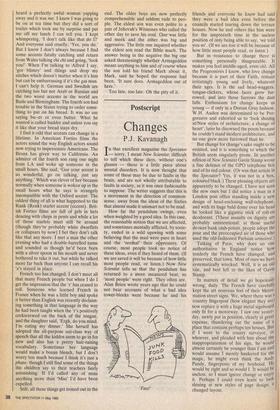Postscript
Changes
P.J. Kavanagh
In that excellent magazine the Spectator — sorry, I mean New Scientist; difficult to tell which these days, without one's glasses — there is a little piece about mental disorders. It is now thought that some of these may be due to faults in the brain, and are not wholly attributable to faults in society, as it was once fashionable to suppose. The writer suggests that this is, a movement in the direction of common- sense, away from the ideas of the Sixties that almost made it unsmart not to be mad.
How far the pendulum swings, even when weighted by a good idea. In this case, the reasonable notion that we are affected, and sometimes mentally afflicted, by socie- ty, ended in a wild upswing with some believing that the mad were pure in heart and the 'noriVial' their oPpressors. Of course, most people took no notice of these ideas, even if they heard of them. (If we are saved it will be because of how little most people read, or listen.) Now New Scientist tells us that the pendulum has returned to a more measured beat, so 'most people' were right. They often are. Alan Brien wrote years ago that he could not bear accounts of what a bad idea tower-blocks were because he and his
friends and everyone he knew had said they were a bad idea even before the councils started tearing down the terrace houses. Now he and others like him were for the umpteenth time in the useless position of only being able to say, 'we told you so'. (If we are lost it will be because of how little most people read, or listen.)
But in resistance to change there is something personally disagreeable. It makes you feel middle-aged, even old. All the Progressives I know, who love change because it is part of their Faith, remain irritatingly young and lively, whatever their ages. It is the sad head-waggers, tongue-clickers, whose faces grow fur- rowed, and into those furrows the dust falls. Enthusiasm for change keeps us young — if only in a Dorian Gray fashion. W.H. Auden was determined to be Pro- gressive and exhorted us to 'look shining at/New styles of architecture, a change of heart'; later he disowned the poem because he couldn't stand modern architecture, and no one grew more furrowed than he.
But change for change's sake ought to be resisted, and it is something to which the British seem singularly prone. In another edition of New Scientist Gavin Stamp wrote a fine defence of the GPO telephone box and of its red colour. (Or was that article in the Spectator? Yes, it was not in a box, coloured black.) These pleasing objects are apparently to be changed. I have not seen the new ones but I did notice a man in a London post office standing inside a new, design of head-enclosing wall-telephone, and with its huge bald dome over his head he looked like a gigantic stick of roll-on deodorant. (These assaults on dignity are probably unintentional: at those useful devices bank cash-points, people adopt the pose and the preoccupied air of those who used the old-fashioned Parisian urinoires.) Talking of Paris, why does no one authoritative in England notice how tenderly the French have changed, and preserved, that town. Most of ours we have systematically wrecked. Well, it is an old tale, and best left to the likes of Gavin Stamp. In matters of detail we go hopelesslY wrong, daily. The French have carefullY kept the art nouveau feel of their Metro station street signs. We, where there was 3 country fingerposi (how elegant they are) now replace it with a huge metal signboard only fit for a motorway. I saw one yester- day, newly put in position, clearly at great expense, thundering out the name of a place that contains perhaps ten houses. But if I went to the county surveyor, or whoever, and pleaded with him about the inappropriateness of his sign, he would almost certainly be younger than I am and would assume I merely hankered for the magic, he might even think the AndY Pandy, fingerposts of my boyhood. He would be right and so would I. It would be useless, so I must ignore change or enjoY it. Perhaps I could even learn to look shining at new styles of page design. a changed layout.














































 Previous page
Previous page